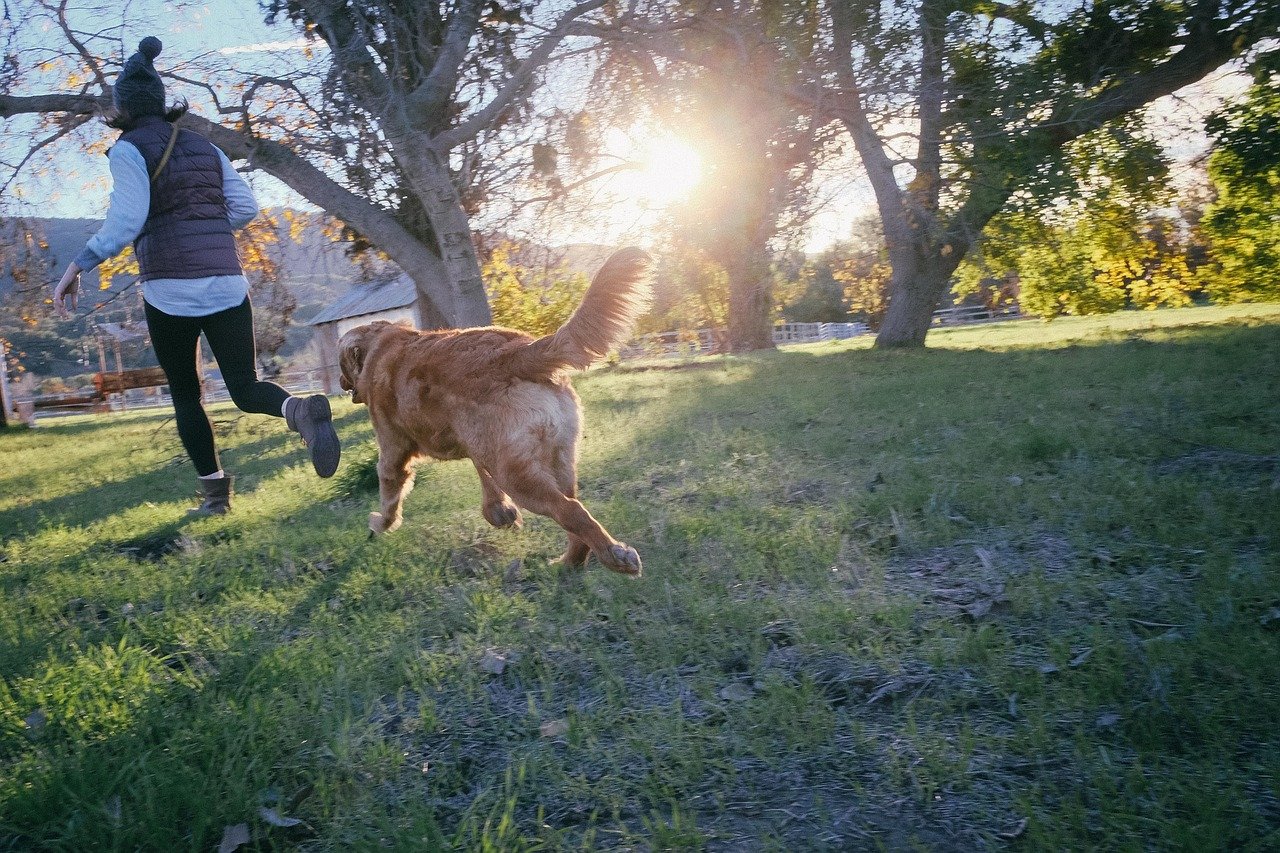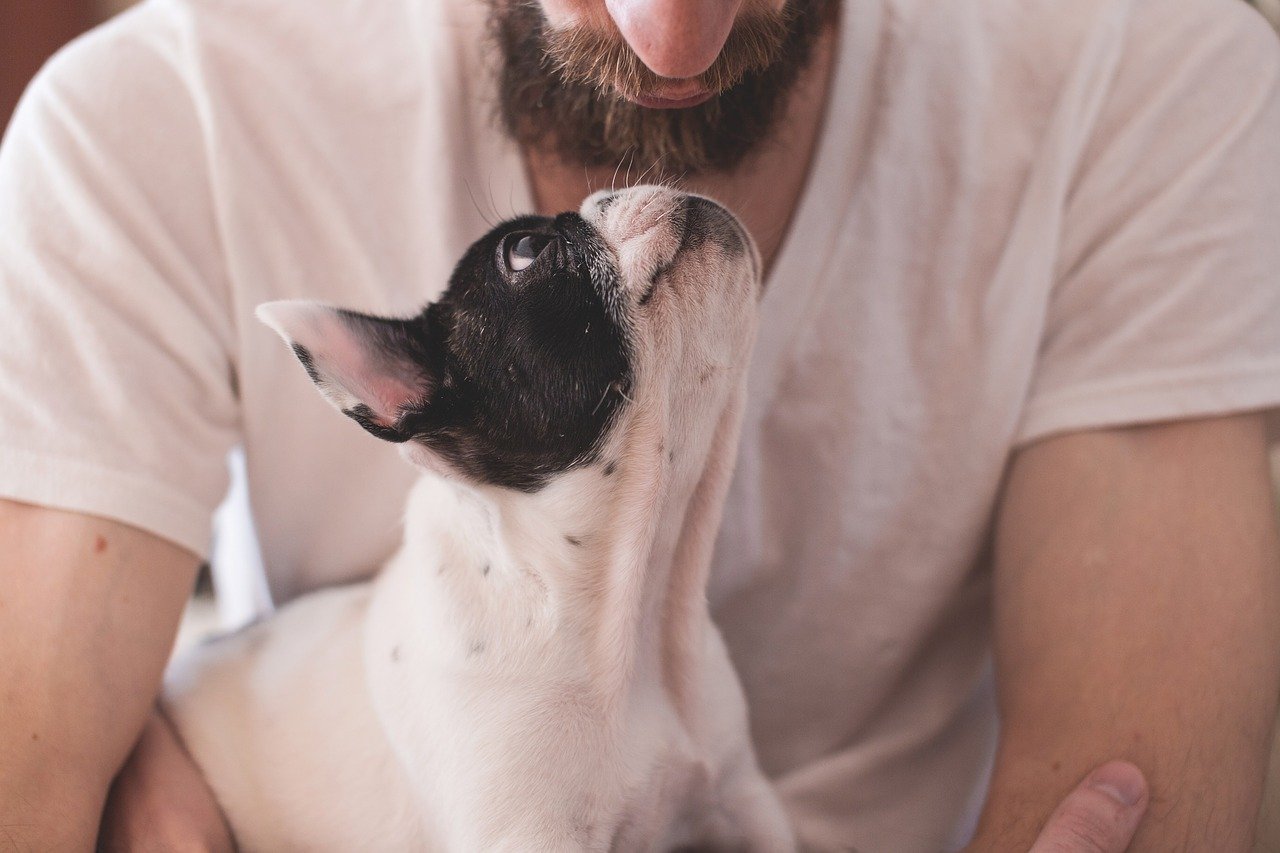It’s something that a lot of people deal with, but not a lot of people talk about it. So let’s talk about it — and how to use positive forces to assuage the effects. One of those positive forces? The four-legged, tail-wagging kind.
There are the obvious benefits of having a dog, of course, and any canine lover doesn’t need to be told about the everyday delights of having a darling four-legged friend around — the feverish tail wagging inspired by a favorite human’s homecoming, the sleepy cuddles, the delight on their faces when notified of an upcoming walk — but dogs can have even more positive effects on a person’s mental state that many of us realize. And when it comes to the depression, anxiety, and stress (in many forms) that are such a significant aspect of the human experience, we think investigating the canine effect on human mental health is a worthwhile one.

Mental health — where we are.
Anxiety and depression affect a huge number of Americans. Recent research suggests that 18% percent of people 18 and over in this country experience some form of an anxiety disorder — that’s about 40 million adults. The negative effects of this disorder can show up in myriad forms, from toxic patterns in relationships to debilitating work performance to hospitalization. As far as cause goes, there’s a number of risk factors: genes, trauma, situational factors such as jobs and relationships, and any other combination of occurrences unique to an individual.
And then there’s anxiety’s closest link: depression. Half of people diagnosed with depression are also diagnosed with a form of anxiety disorder. While numerically, depression affects a smaller portion of the population than anxiety does at 16 million adults (or 6.7 percent) to anxiety’s 40 million, it’s a serious and debilitating condition in all its forms.
The most commonly recognized variations are major depressive disorder and persistent depressive disorder (also known as dysthymia). Depression also affects women in greater numbers than it does men — premenstrual dysmorphic disorder is a form that is similar to PMS, but has more debilitating effects and more extreme mood changes.

So let’s talk about positive steps. Specifically, four-legged, paw-footed steps.
How exactly do dogs help anxiety, depression, and/or stress? Every individual’s situation is a unique one, of course, and must be assessed carefully for that person’s specific needs. But the possibilities of these incredible and boundless creatures are powerful and can be life-changing — so we’re more than happy to expound on them. While there can be many different solutions to the management of anxiety and depression, all your brain knows about any successful tactic is “it floods me with more serotonin.” Increased levels of serotonin is the key towards easing both anxiety and depression. Luckily, there are more than a few ways to get there. Even more luckily? Hanging out with dogs accomplishes a lot of them.
Let’s start with the basics.
Straight-up love and affection (with evolutionary explanations).
Research shows that when we pet a dog (or cat), not only is the feel-good chemical (also known as the “love hormone”) oxytocin released (the same one we feel when hugging a loved one), but our levels of the stress hormone cortisol dips. Oxytocin promotes attachment and is thus a foundational element of relationships. For someone struggling with anxiety and depression, this kind of attachment with a dog has the possibility of taking them outside the hopelessness of their anxious or depressed state, and perhaps allowing them to see new hope in a connection with a sweet canine.
As wonderful and supportive as friends and family can be when we’re experiencing the hopelessness of depression and the spirals of anxiety, the primal connection we have with dogs, their upfront expressions of affection, and their more-discernible needs (and expression of those needs), is a kind of powerful, moving simplicity that not only doesn’t pile on to the stresses of life but shows us the potential joys we weren’t able to see before.
In fact, the simplicity of the connection between humans and dogs may be described as a foundational, primal sort: researchers have delved into the evolutionary behavior of both species, and found parallels that may explain why pups can be so positive to our mental health. There’s the pack mentality, of course: the social-for-survival instinct that inclines both dogs and people to live within a family unit — protecting and checking in on one another. When dogs and humans occupy the same family unit, research shows that many dog owners unquestionably consider their dog a family member whose status is consistent with human relatives.
This relationship evidently has deep roots — as long as homo sapiens have been around, we’ve had the mutually beneficial partnership with dogs that we enjoy today (researchers bolster this with the observation that domestic dogs have been living and evolving apart from wolves for as long as 100,000 years or more). The dynamics of the relationship didn’t look especially different back in its primal origins, either. Dogs provided protection, helped guide hunting and sniffed out potential dangers, while people provided them with food and shelter.
It’s a symbiosis we still see, one that not only grants each side companionship, but makes us all (canine and homo sapien) feel needed. It’s one of the most primal forms of validation there is, this dog-human relationship.
So while our relationships with dogs aren’t the only sort that grant us unconditional love, the canine offering of the wonderful unconditional phenomenon is one that’s certainly unique to these four-legged friends. Dogs don’t inflict the same politics, dramas, insecurities and other draining forces that people can sometimes inflict on other people — the same forces that can be contributing factors to depression, anxiety, and stress on all levels.

Exercise.
And then there’s the exercise inspiration that dogs incite. Whichever way you look at it, dogs will forever insist on being exercised, whether it’s walk around the block, a hike, or an energetic romp at the dog park. Some dogs love to chase a frisbee for hours and others just want to tear up a hiking trail, but wherever they take you, it’s a step further from the cloud-like feeling of depression. The joy and positive effects of exercise on dogs is most certainly mirrored in people, making this relationship one rife with possibility for assuaging the effects of anxiety, depression, and overall stress.
Exercise is one of the many spinoff benefits to owning a dog. Naturally built into the experience of satisfying a dog’s basic needs, once you own or spend more time with dogs, the more you’ll get more exercise without having to plan for it. Exercise lowers your blood pressure, increases endorphins that fight depression and anxiety, and it makes dogs happy — an emotion they return to you out of gratitude. There we are back at that symbiotic relationship again!
Structure. Dogs help allay the pain of depression and anxiety, yes, but they also give people struggling with these conditions a tangible reason to harness positive energy into caring for something. They offer a sense of need and urgency — they need to be fed, they need to be walked — and most of all, as mentioned above: they make people feel needed, necessary, important.
This simple fact — being needed — is a powerful way to re-anchor a person’s place in the world if they’ve been blown off course by the effects of depression, anxiety, or stress. Whether that’s caring for one’s one dog or watching someone else’s pup, people can find purpose in the four-pawed approach.

The takeaway? As goes the oft-repeated saying when it comes to struggle, admitting the problem is an essential first step to solving it. It can be hard for people to accept that they’re experiencing forms of mental illness, such as anxiety and depression. It’s even harder to admit it. The thing about dogs, though, is that they’re so attuned to human emotion and impulse, that there’s no hiding from them.
Depression, anxiety, and stress are bound to be a part of life at one point or another — it’s all about managing the ebb and flow of being a human being accumulating experience. Life is about creating your own happiness by finding elements of joy where you can.
As we’ve seen, dogs can be an incredibly powerful part of weaving consistent delight into your day-to-day life: the kind of delight that allays insecurities, calms worry, and lifts your spirits when hope seems elusive. Not only do dogs provide the positive feels you need when you’re experiencing the effects of anxiety and depression, but they validate the presence of emotion — whatever it is — without judgement, and without the unfortunate stigmas that exist in some corners when it comes to mental illness.
Source: https://www.rover.com/blog/dogs-can-help-depression-stress-anxiety-complete-guide/


